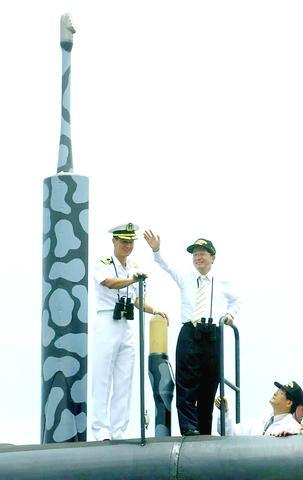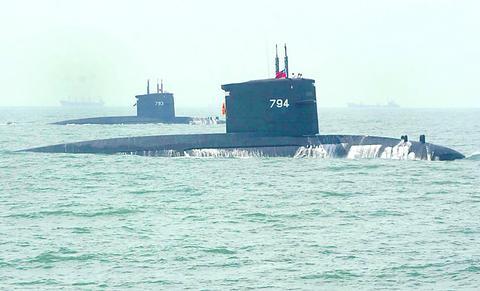More than 100 reporters accompanied President Chen Shui-bian (
"Submarines are the most ideal weapons we can use during a combat situation in the Taiwan Strait. They are also a basic weapon for an island nation such as Taiwan to use to defend itself," Chen said.
Chen made his remarks at the navy's Mercury Port inside Tsoying's largest naval base, in Kaohsiung. The Mercury Port is an exclusive port for the country's four submarines, which include two US-made Guppy-class vessels and two Dutch-made Zwaardvis-class vessels.

CHIANG YING-YING, TAIPEI TIMES.
It was the president's second time aboard a submarine since he took office in 2000, but it was the first time that he led a group of reporters through a submarine joint military exercise.
Chen hopped in the SS-794 Sea Tiger while reporters were divided into two groups to go aboard the Lafayette-class frigate PFG-1207, the Wu Chang, and the SS-793 Sea Dragon, which also had Presidential Office Secretary-General Su Tseng-chang (
According to Captain Chou Yih-chun (周益群), the commanding officer of the SS-793, yesterday's exercise was participated in by two submarines, three frigates, one S-70C helicopter and one S-2T Turbo Tracker aircraft. During the exercise, the two submarines were opposed to the three frigates and two aircraft.

PHOTO: CHIANG YING-YING, TAIPEI TIMES
According to the MND, the two submarines successfully destroyed the frigates using torpedoes in the simulated battle, and the entire action was processed on a computerized simulated program.
The distance between the SS-793 and SS-794, which were the focus of yesterday's exercise, was approximately 300m. Both submarines cruised at the speed of 18 knots and dived to reach a depth of 17.5m at a location which was approximately 8.8km away from Tsoying base.
Chou said that the Zwaardvis-class submarines are capable of diving to a depth of 240m.
In addition to the simulated naval battle, the two submarines also carried out an "emergency surface" to end the entire exercise.
During the exercise, the president suffered from minor sea sickness, but he still took the helm of the SS-794 and acted like a sailor for a few minutes.
The entire exercise lasted approximately two hours.
Due to concerns involving the safety of the president and the reporters, the navy canceled several items during yesterday's exercise. However, some politicians complained that the president was wasting public funds and leaking crucial military secrets by what he did yesterday.
In addition, crtics said, a small-scale military exercise like yesterday's would not help sailors in a real combat situation.
"There might be concerns that classified military information might be leaked," said Democratic Progressive Party Lawmaker Kuo Jung-tsung (
The navy also invited several female petty officers to board the submarines and frigates and participate in yesterday's exercise. However, it is still not permitted for female personnel to serve on a submarine.
"We do not have enough room inside a sub [for additional facilities for women] and may not be able to provide them with adequate privacy, either," said Wu Shang-fu (吳商福), a senior first class petty officer onboard the SS-793.
Also see story:

CHAOS: Iranians took to the streets playing celebratory music after reports of Khamenei’s death on Saturday, while mourners also gathered in Tehran yesterday Iranian Supreme Leader Ayatollah Ali Khamenei was killed in a major attack on Iran launched by Israel and the US, throwing the future of the Islamic republic into doubt and raising the risk of regional instability. Iranian state television and the state-run IRNA news agency announced the 86-year-old’s death early yesterday. US President Donald Trump said it gave Iranians their “greatest chance” to “take back” their country. The announcements came after a joint US and Israeli aerial bombardment that targeted Iranian military and governmental sites. Trump said the “heavy and pinpoint bombing” would continue through the week or as long

TRUST: The KMT said it respected the US’ timing and considerations, and hoped it would continue to honor its commitments to helping Taiwan bolster its defenses and deterrence US President Donald Trump is delaying a multibillion-dollar arms sale to Taiwan to ensure his visit to Beijing is successful, a New York Times report said. The weapons sales package has stalled in the US Department of State, the report said, citing US officials it did not identify. The White House has told agencies not to push forward ahead of Trump’s meeting with Chinese President Xi Jinping (習近平), it said. The two last month held a phone call to discuss trade and geopolitical flashpoints ahead of the summit. Xi raised the Taiwan issue and urged the US to handle arms sales to

State-run CPC Corp, Taiwan (CPC, 台灣中油) yesterday said that it had confirmed on Saturday night with its liquefied natural gas (LNG) and crude oil suppliers that shipments are proceeding as scheduled and that domestic supplies remain unaffected. The CPC yesterday announced the gasoline and diesel prices will rise by NT$0.2 and NT$0.4 per liter, respectively, starting Monday, citing Middle East tensions and blizzards in the eastern United States. CPC also iterated it has been reducing the proportion of crude oil imports from the Middle East and diversifying its supply sources in the past few years in response to geopolitical risks, expanding

Pro-democracy media tycoon Jimmy Lai’s (黎智英) fraud conviction and prison sentence were yesterday overturned by a Hong Kong court, in a surprise legal decision that comes soon after Lai was jailed for 20 years on a separate national security charge. Judges Jeremy Poon (潘兆初), Anthea Pang (彭寶琴) and Derek Pang (彭偉昌) said in the judgement that they allowed the appeal from Lai, and another defendant in the case, to proceed, as a lower court judge had “erred.” “The Court of Appeal gave them leave to appeal against their conviction, allowed their appeals, quashed the convictions and set aside the sentences,” the judges